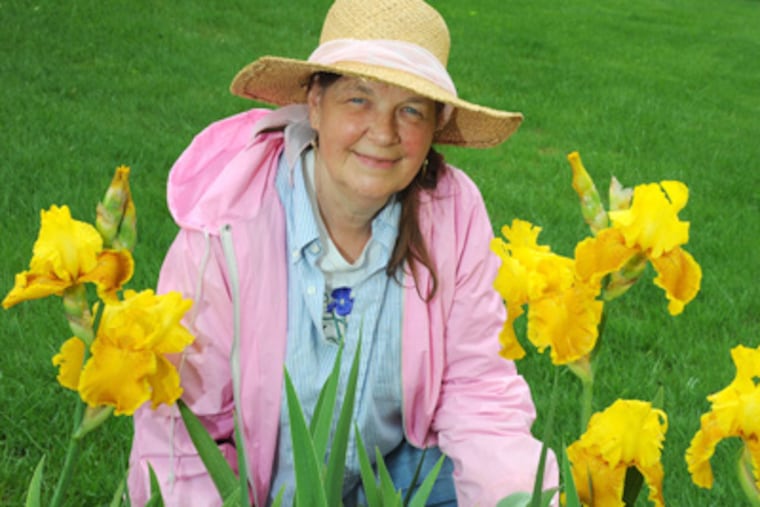Bucks County iris grower just can't let go
Just down the road from the Delaware River in the far reaches of upper Bucks County, an acre of vibrant purples, sunny yellows, and delicate pinks, violet-blues, and pale oranges is slowly blooming once again - and Helen Lewis is bracing for the certain frenzy.

Just down the road from the Delaware River in the far reaches of upper Bucks County, an acre of vibrant purples, sunny yellows, and delicate pinks, violet-blues, and pale oranges is slowly blooming once again - and Helen Lewis is bracing for the certain frenzy.
For nearly three decades, Lewis has grown irises on this verdant stretch of farmland in Tinicum Township, and she dearly loves her six-petaled beauties. "My children," she calls them.
But this year, as she prepares for the annual return of faithful customers to her River Valley Iris Garden, Lewis wonders how much longer she can keep up the back-breaking work. Next month she will turn 66. Her two grown children - of the human variety - come by to help out, and some devotees pull weeds in exchange for free plants.
Yet Lewis finds herself largely the lone warrior in a never-ending battle against invading greenery.
"Like I say, the spirit is willing," she sighed, "but the flesh is weak."
As she contemplates what to do, her flowers beckon.
"It's just the beauty of them," said Lewis, who lives beside the teeming field.
Iris aficionados understand the allure. They come to paint, to photograph, and above all, to buy. Her single tract, Lewis figures, holds more than 1,000 varieties, including vintage irises from the 1960s, '70s and '80s no longer available in catalogs.
This spring, the rain has delayed some of the bloom. The purples rose first, but many others are slowly joining the riot of color, adding yellows, unique pale pinks, champagne-beiges, and purple-blacks. Then there are the two-tones, like the white-splotched batik purples - a flower-power version of a tie-dye T-shirt.
On average, her plants go for $5; specialty specimens fetch $10. "I know a lot of people charge a lot more than I do, but I want people to be able to afford it," said Lewis, who also sells $1 rhizomes as a "surprise" for customers.
With most major growers now in the Pacific Northwest, River Valley is among only a handful of commercial iris gardens left in Pennsylvania and New Jersey. It is the quintessential niche business, dependent on a selling season that lasts only about three weeks, roughly from mid-May through early June.
Other growers have websites and sell online, but Lewis eschews the computer. She notifies her customers the old-fashioned way - with a post card - and has a message on her phone to let callers know when the garden will open. "Very countrified," as she described it.
Born and raised in a farmhouse just down the road from where she now lives, Lewis worked summers on her father's 100-acre farm and learned the downside - one of the only downsides, she insists - of iris-growing by having to weed her mother's modest crop. She graduated from West Chester University with a degree in humanities and got jobs in retail sales and in the office at nearby Van Sant Airport. But even when she was working, she made time for irises.
Her uncle also had an iris garden nearby. Upon his retirement in 1981, Lewis decided to buy up his stock.
A few years later, she bought irises from another garden, then another, and that is how River Valley grew.
Irises aren't hard to cultivate, she said, but there are a few important things to remember. For instance, the rhizome, or bulb, should not be planted deep. Rather, she said, "half of it likes to be out in the sun." The soil should be sandy and well-drained ("they don't like wet feet").
Irises do not flourish in shade. Nor, she said, do they tolerate mulch, which encourages infestation by a borer that hatches in the spring and munches its way down to the rhizome to feed.
Irises also must be thinned, she said, though they will let you know when by producing smaller and fewer blooms. The irises crowd themselves. The weeds just pile on.
"I don't think I'll be doing it that much longer," Lewis said. "It's just so much work, and it doesn't look like the way I want it to be."
Lewis is considering retiring several of the beds. "Ideally," she mused, "I'd probably just have a little garden."
But for a woman whose life has been forever filled with all things iris - including a mural of a giant purple bloom in her home - that would be almost impossible to imagine.